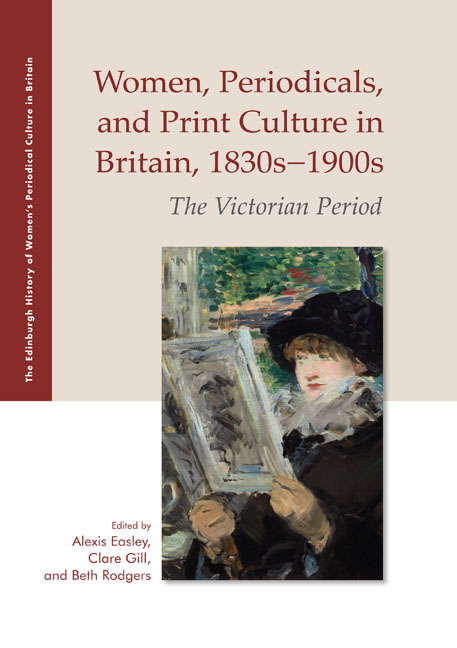Book contents
- Frontmatter
- Contents
- List of Illustrations
- Acknowledgments
- Introduction: Women, Periodicals, and Print Culture in the Victorian Period
- Part I (Re)Imagining Domestic Life
- Part II Constructing Modern Girls and Young Women
- Part III Women and Visual Culture
- Part IV Making Space for Women
- Part V Constructing Women Readers and Writers
- Constructing Women Readers and Writers: Introduction
- 24 ‘Afford[ing] me a Place’: Recovering Women Poets in Blackwood's Edinburgh Magazine, 1827–1835
- 25 Constructing the Mass-Market Woman Reader and Writer: Eliza Cook and the Weekly Dispatch, 1836–1850
- 26 Elizabeth Gaskell and the Habit of Serialisation
- 27 Gender and Genre in Reviews of the Theological Novel
- 28 Reading Poet Amy Levy through Victorian Newspapers
- 29 ‘I simply write it to order’: L. T. Meade, Sisters of Sherlock, and the Strand Magazine
- Part VI Intervening in Political Debates
- Notes on Contributors
- Index
- Plate section
Constructing Women Readers and Writers: Introduction
from Part V - Constructing Women Readers and Writers
Published online by Cambridge University Press: 25 October 2019
- Frontmatter
- Contents
- List of Illustrations
- Acknowledgments
- Introduction: Women, Periodicals, and Print Culture in the Victorian Period
- Part I (Re)Imagining Domestic Life
- Part II Constructing Modern Girls and Young Women
- Part III Women and Visual Culture
- Part IV Making Space for Women
- Part V Constructing Women Readers and Writers
- Constructing Women Readers and Writers: Introduction
- 24 ‘Afford[ing] me a Place’: Recovering Women Poets in Blackwood's Edinburgh Magazine, 1827–1835
- 25 Constructing the Mass-Market Woman Reader and Writer: Eliza Cook and the Weekly Dispatch, 1836–1850
- 26 Elizabeth Gaskell and the Habit of Serialisation
- 27 Gender and Genre in Reviews of the Theological Novel
- 28 Reading Poet Amy Levy through Victorian Newspapers
- 29 ‘I simply write it to order’: L. T. Meade, Sisters of Sherlock, and the Strand Magazine
- Part VI Intervening in Political Debates
- Notes on Contributors
- Index
- Plate section
Summary
WHEN AURORA LEIGH, the eponymous poet-protagonist of Elizabeth Barrett Browning's (1806–61) epic ‘novel in verse,’ discovers that ‘In England, no one lives by verse that lives,’ she moves beyond the rarefied sphere of poetry to secure a regular income by writing for the periodical press (1993: 3.307). Like many Victorian poets, Aurora writes for ‘cyclopedias, magazines, / And weekly papers’ (3.310), undertaking what she considers to be inferior hack work that appeals to the taste of ‘light readers’ (3.319). For Aurora, poetry, as a cerebral and pure form of art, should not be tainted by the vulgar dictates of the commercial marketplace. While Barrett Browning would have acquiesced with the spirit of the value-laden dichotomy that Aurora identifies between writing for art and writing for the market, she nevertheless balanced her own sense of poetry's elevated artistic value against a pragmatic understanding of the cultural and economic significance of periodicals for the careers of literary authors. Her first publicly published poems appeared in the New Monthly Magazine (1814–84) in 1821, and she continued to place poetry intermittently in periodicals and newspapers in Britain and America throughout her career in spite of her deep reservations about the press as a suitable medium for poets. Moreover, as her letters reveal, Barrett Browning was also an avid reader of newspapers and periodicals, including press reviews of her own works, which she analysed forensically. In this sense, even when she refused press commissions, her poetic work was nevertheless still bound up with the cultural economy of the periodical industry, which had a shaping influence on the literary reception and sales of books.
As this example illustrates, active participation with the press was an instrumental facet of the literary labour of Victorian authors. This was especially the case for women, who regularly looked to the ever-expanding periodical press for opportunities to attract a reading audience for their work. For many of the period's foremost women writers, including poets like Barrett Browning and Christina Rossetti (1830–94) and novelists such as Elizabeth Gaskell (1810–65) and George Eliot (1819–80), it was in the pages of newspapers and magazines that their literary works were debuted to the public.
- Type
- Chapter
- Information
- Women, Periodicals and Print Culture in Britain, 1830s–1900sThe Victorian Period, pp. 395 - 398Publisher: Edinburgh University PressPrint publication year: 2019



